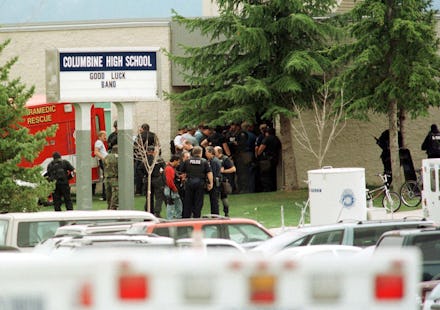Have gun laws gotten more lax since Columbine? Here's what you need to know.

On April 20, 1999, two students walked into Columbine High School in Colorado and murdered 12 of their classmates and one teacher.
The story captivated the pre-9/11 world and dominated in the media. Day in and day out, theories were explored as to what would possibly motivate two high school seniors to plan and carry out a horrific mass shooting. To help make sense of it all, parents, the media and the general public attempted to place the onus of responsibility on everything from violence in television and video games to personally blaming singer Marilyn Manson.
In the days, weeks and months following the tragic event, legislators also gave their best attempt at passing gun regulations to prevent an attack like this from ever happening again. Here's what we've accomplished in the 18 years since one of America's deadliest school shootings.
School shootings stir the gun control conversation
In the 12 months following the Columbine shooting, legislators put forth more than 800 new bills having to do with guns, Popular Science reported. The bills included measures to strengthen background checks and the protection of rights for gun owners who cross state lines. In total, Popular Science reported, about 10% of those bills passed.
In the year 2000, a measure that would have required sellers at gun shows to conduct the same kind of background checks that licensed dealers perform was defeated in the Colorado legislature.
But as the Guardian reported, Colorado citizens decided they had had enough and gathered the signatures needed to put the measure to a statewide vote in 2000. It passed with over 70% of the vote.
In the year following the Sandy Hook school shooting in 2012, which left 20 children and six teachers dead, about 1,500 state gun bills were introduced across the nation, according to the New York Times. Of those, 178 passed at least one chamber of a state legislature and 109 became law — though some of the laws actually weakened, rather than strengthened, gun control.
Little action from Congress
On the federal level, Washington Post reported, "the only policy changes came from the executive branch, with President Obama's 23 executive actions to reduce gun violence."
"Since 13 people were killed at Columbine High School in 1999, Congress has passed one major law strengthening gun control in the aftermath of a mass shooting," the Washington Post reported in 2014.
However, that change didn't come until after the 2007 shooting at the Virginia Polytechnic Institute. There, a senior at the school shot and killed 32 people and wounded 17 more, at the time making it the deadliest mass shooting carried out by a single shooter in the United States. Several months after that attack, Congress passed a law improving the national background check system. The new law added more records to the federal database to check for felons and mentally ill individuals, according to the Washington Post.
It all comes down to states
So, have gun laws become more relaxed over the last 18 years? Yes and no. On the federal level little has changed, but on a state level things are in a constant state of flux. As the Law Center to Prevent Gun Violence reported in its 2016 end of year review, a dozen states passed gun control legislation that the center deemed as positive, including California's SB 1235, which requires all ammunition sellers to be licensed, to conduct background checks and to report ammunition sales records. Ohio also received positive recognition for SB 97, a measure prohibiting violent career criminals from knowingly buying, possessing or carrying a firearm.
On the flip side, the Law Center to Prevent Gun Violence also reported new legislation that was enacted to weaken gun control, such as Arizona's HB 2338, which prohibits schools from restricting the carrying of guns on public rights of way, and Kansas' HB 2502, which prohibits restrictions on employees from carrying concealed guns at work and limits restrictions on firearms in public buildings.
"State gun laws are critical because our federal gun laws are extremely weak and leave enormous gaps," the Law Center to Prevent Gun Violence said in a post. "For example, 40% of all gun sales can be completed without background checks because federal law doesn't require checks for firearm sales between private parties. Unless states step in and adopt their own smart laws, federal gaps like these allow guns to easily flow into the hands of criminals."
Gun laws vary widely from state to state, with states like California, New Jersey and Massachusetts all adopting far more progressive gun laws than places like Oklahoma, Kansas and Kentucky, according to the Law Center to Prevent Gun Violence. And as the Atlantic reported, "the states that impose the most restrictions on gun users also have the lowest rates of gun-related deaths, while states with fewer regulations typically have a much higher death rate from guns."
As to why the federal government doesn't do more, Bill Clinton tried to explain it in an interview with Rolling Stone in 2000. "The NRA can muster an enormous percentage of the vote — maybe 15%, even 20% in some districts, because for those people guns are a primary voting issue," he said. "So if you've got a race where you're ahead 60 to 30, but in your 60%, gun control is a primary voting issue for 10% of the people, and in their 30 it's a primary voting issue for 20% of their people — the truth is, you're a net loser by 10%. That's what happens in Congress and state legislatures. They're genuinely afraid."